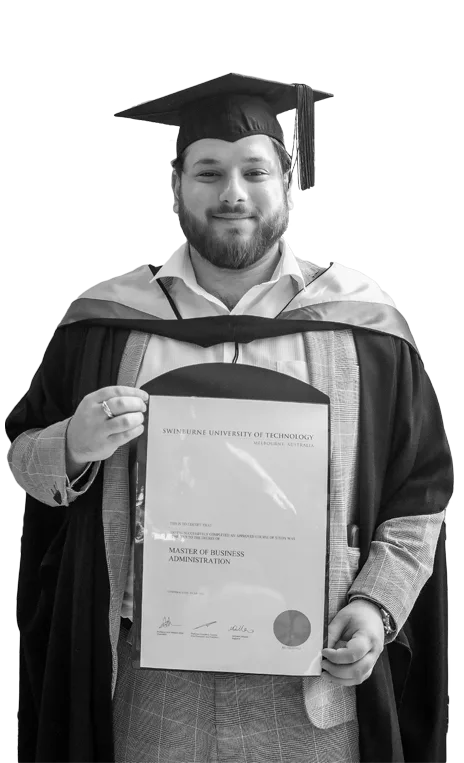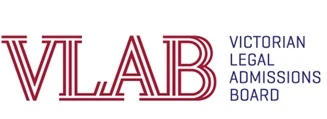100% Online
Gain a digitally informed toolkit ready to tackle emerging legal technologies that are transforming the Australian legal system.
100% Online*
Learning Mode
Undergraduate
Qualification
4 years full-time
Duration
Mar, Jul, Nov
Start Date
32
Units
$2,124*
Fee Per Unit
‘The support level has been unmatched. OLAs, student advisors, anyone you contact is always there for you. There is always someone to reach out to, always someone to help, always someone you can lean on.’
Corey, Swinburne Online graduate
As a Lawyer, you’ll have a strong future ahead of you, with a 20% increase expected in the next five years.
Our Law courses have ranked in the Top 250 by THE World Universities Rankings for 2025.
The sweeping uptake of digital technologies in legal professions is revolutionising legal practice, just as it is changing the way we all live and work. Today’s legal professionals need to be not only commercially savvy, but have the adaptability to work with emerging technologies across continually innovating legal landscapes.
Pathway to becoming a lawyer
Swinburne Online’s Bachelor of Laws is approved by the Victorian Legal Admissions Board, with this course fulfilling the first requirement on the pathway to becoming a practicing lawyer.
You’ll develop a nuanced understanding of digital disruption and its legal implications, which will open your legal career for work in criminal, international, commercial, finance law and more. With a digitally informed toolkit at your disposal, you will be able to take advantage of the growing number of technology-focused opportunities in legal fields that govern cyber security, media, branding and advertising.
Like all Swinburne Online courses, practical experience is fundamental. This is why the Bachelor of Laws prioritises work integrated learning through professional placements. By participating you’ll have the opportunity to network and learn directly from experienced legal professionals, while acquiring a practical legal skill set.
Your placement can be at any workplace where legal work is performed, as long as your work experience during the placement is of a legal nature. You can take your placement overseas or in Australia, as long as it’s approved by the Course Director, so you have the opportunity to try different legal work during your practical experience.
Swinburne Online will prepare you to meet the challenges of rapid technological change and upheaval in the legal sector, and set you up to chart a success career in law.
Supervised examinations
Supervised examinations are a compulsory component of the course and will be scheduled for a specific date and start time at the end of each teaching period. If you are an Australian citizen, you’ll still be able to sit these exams in-person at most capital cities around the world.
Fill in your details to receive detailed information regarding:
Studying at Swinburne Online gives you the freedom to study how it suits you. Decide when and where it fits in with your life and tailor your study journey to your own needs. Get a world-class degree without giving up what’s important.
Flexible study at Swinburne Online
Set a study pace that work with what’s going on in your life. If you’re unsure about how much you can commit to, we can offer part-time options and the option of increasing your unit load as your progress. Note, however, that you must not complete the program in less than 36 months due to VLAB requirements.
You don’t have to put your life on hold to study. Prioritise what matters to you and fit study around family, work and personal commitments through a course that is flexibly designed for online learners.
Start when it suits. Swinburne Online offers multiple intake dates and flexible unit availability, so you can choose when you begin your studies or if you need to take a break.
Flexible study requires flexible support. As a Swinburne Online student, you’ll have support for extended hours, seven days a week. Student Advisors available to help with anything from tech support to research advice. You will also have dedicated online tutors in each of your units.
The Bachelor of Laws consists of 32 units, including, 21 core Law units, four Law electives and seven units of Secondary Studies, comprising of electives. You will also complete three Professional Experiences in law.
Your learning will focus on legal technology and innovation, looking at how the relationship between law and technology has changed and will continue to over time. Your units will focus on how to understand the different nuances and adapt to new technologies.
Supervised examinations
Please note that an accreditation requirement for the Bachelor of Laws is that all supervised examinations are only held in-person, in paper format.
Supervised examinations are a compulsory component of the course and will be scheduled for a specific date and start time at the end of each teaching period. If you are an Australian citizen, you’ll still be able to sit these exams in-person at most capital cities around the world.
View your course structure
Studying law with Swinburne Online is a unique opportunity. Our courses are at the forefront of industry and provide you with the practical skills to success come graduation. View all units in your bachelor’s degree.
View All UnitsYour study journey with Swinburne Online is tailored to the digital space. You’ll study in a dynamic virtual classroom environment and interact with your peers in the custom-built social platform. You will also receive support at the times you need it from advisors who understand studying online.
You’ll complete each of your units in Canvas, your online classroom, and be guided through coursework by an online tutor with real-world experience in your field of study. Canvas is where you’ll access classes, assignments and discussion boards with your peers.
The Student Hub is your online campus, where you’ll access the support and resources to assist you throughout your study journey. From managing your course to technical support and library resources, you’ll find it all in one easy location.
Swinburne Online will be there for you each step of the way. From enrolment through to graduation, we offer extended, flexible support in each of your units and advisors to assist with any queries.
One of:
This course is not available to international students.
Students who do not meet the above entry requirements can still gain admission to the Bachelor of Laws through one of several alternative pathways.
These pathways include both dedicated undergraduate certificates that help you prepare for the subject matter and workload of the Bachelor of Laws, as well as complementary studies through related undergraduate degrees.
Please see tabs below for information on individual pathways.
Meeting the minimum entry requirements for the course does not guarantee offer of a place. See Admissions at Swinburne, for general information about admission process.
This pathway qualification helps students develop the analytical and planning skills essential to a career in law. A focus on business strategy and innovation equips students to flourish in a corporate law environment, ideal for students ultimately seeking a role as general counsel.
A four-unit course typically requiring six months of full-time study, the Undergraduate Certificate of Business provides significant flexibility, offering students the ability to tailor their entry into law to suit their career goals.
Core unit:
Choose three units from the below:
Students seeking to enter the Bachelor of Laws are recommended to select Financial Information for Decision Making as one of their electives. This unit will better prepare students for the workload required in the Bachelor of Laws and will be more relevant to material covered in the degree.
Students will need to complete all four units with an average mark of 60% to gain entry to the Bachelor of Laws. All completed units will be credited against the Bachelor of Laws.
Upon successful completion of the Undergraduate Certificate of Business, students will need to contact the admissions office to transfer to the Bachelor of Laws.
The Undergraduate Certificate of Criminal Justice and Criminology exposes students to foundational concepts in criminal law. Students will develop an understanding of different theoretical models of crime and the structure of the Australian legal system. It also explores the processes and procedures used by different parts of the legal system to manage, deter, and punish criminal offences.
As a four-unit course which typically requires six months of full-time study, the Undergraduate Certificate of Criminal Justice and Criminology is ideal for those considering a career in criminal law. It equips you with the essential knowledge needed to progress to the Bachelor of Laws with confidence.
Core units:
Students will need to complete all four units with an average mark of 60% to gain entry to the Bachelor of Laws. All completed units will be credited against the Bachelor of Laws.
Upon successful completion of the Undergraduate Certificate of Criminal Justice and Criminology, students will need to contact the admissions office to transfer to the Bachelor of Laws.
Students can transfer to the Bachelor of Laws after completing four units in the Bachelor of Criminal Justice and Criminology.
An alternative to the Undergraduate Certificate of Criminal Justice and Criminology, this pathway offers a different range of foundational units for students interested in criminal law.
Students interested in enrolling in this pathway with the intent of transferring the Bachelor of Laws are recommended to select from the following units:
Students will need to complete all four units with an average mark of 60% to gain entry to the Bachelor of Laws. All completed units will be credited as secondary electives against the Bachelor of Laws.
Upon successful completion of the required units, students will need to contact the admissions office to transfer to the Bachelor of Laws.
The estimated fee per unit for this course is $2,124*. There are 32 units in the Bachelor of Laws, each unit is worth 12.5 credit points.
*Unit fees are subject to change annually.
Commonwealth provided loans are available to assist eligible students to pay their course fees and there are a range of university, government and privately funded scholarships and prizes.
Discover more information about HELP loans.
Course fees will be affected by a student’s unit selection and any credit awarded in recognition of previous academic experience.
This course is not available to international students.
Domestic students also contribute to student services and amenities via an annual fee.
Scholarships are available for both commencing and current students. You may be eligible for Swinburne Scholarships.
Upon graduation you will be able to steer your career in the direction of your choice. That may be towards traditional fields of legal practice – such as criminal law, international law or finance law.
Our graduates work in a range of rewarding roles and industries. The Bachelor of Laws prioritises enhancing your technical literacy so that you can graduate with a future-focused skill set. You will:
Navigate the intricacies of commercial law, which govern commercial transactions within Australia and internationally. Work in specialist areas that include: company law, corporate governance, consumer protection, and environmental law.
In an era of digital disruption and diversifying media, you can gain expertise in the field of Intellectual Property law. Calling upon your informed understanding of technological change – and the important role that the law plays in encouraging further innovation – while protecting the rights of creators and businesses.
Consider Native Title laws, in accordance with an informed and culturally sensitive approach to the mediation of the relationship between Aboriginal and Torres Strait Islander peoples, government and local communities.
Oversee the implementation of international law from an Australia perspective, taking into account the intersection of other jurisdictional legal systems and the complexities that may arise.
The Bachelor of Laws satisfies the academic requirements for admission to practice as a lawyer in the Victorian and Australian Federal legal systems as set by the Victorian Legal Admissions Board.
Please be advised that non-academic requirements must also be satisfied for admission to practice and that no law degree allows graduates to practise straight away.
All laws graduates must also complete Practical Legal Training (PLT) prior to applying for admission to practice as a lawyer.


